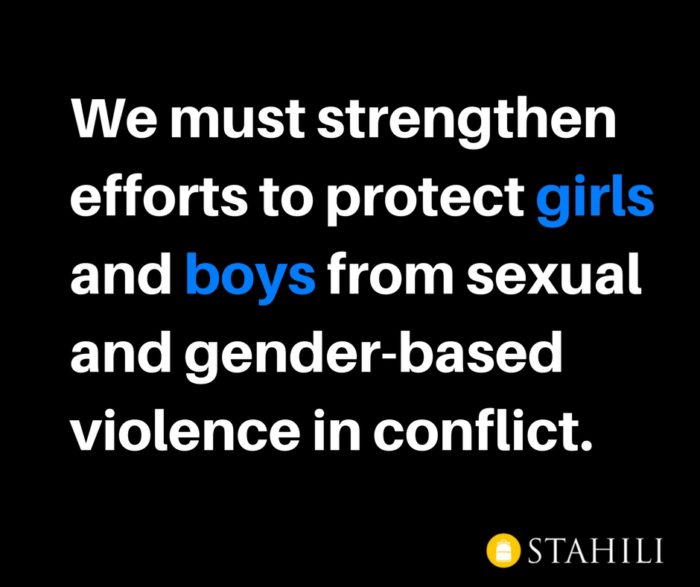Sexual Violence Against Girls and Boys in Armed Conflict
Sexual and other forms of gender-based violence (SGBV) while prevalent in conflict zones around the globe, is grossly underreported. Used as a method of war or as part of a widespread and systematic attack against the civilian population, SGBV impacts men and boys as well as women and girls. Fear and cultural stigma are among the primary reasons that prevent survivors from sharing their stories.
So what is conflict-related sexual violence? It refers to rape, sexual slavery, forced prostitution, forced pregnancy, forced abortion, enforced sterilisation, forced marriage or any other grave form of sexual violence which is directly or indirectly linked to a conflict.
Sexual and gender-based violence against children is one of the Six Grave Violations against children during armed conflict. Its targeted use against children mostly by armed groups such as ISIL, Al-Shabaab, and Boko Haram is of particular concern. So too are reports of sexual violence by government forces and by UN peacekeepers in countries like South Sudan, to name one. Perpetrators are, however, rarely brought to justice as SGBV often exists in a “rule of law vacuum”.
Boys as well as girls are victims of these crimes. In Syria, for example, boys are known to be subjected to sexual violence while in detention, often remaining silent for fear of being ostracised due to accusations of homosexuality. In Afghanistan, boys are sold into sexual slavery and prostitution and trafficking. Boys associated with armed forces may also be forced to commit rapes either directly by their commanders or indirectly through peer pressure. Displaced children and ethnic minorities groups are particularly vulnerable, with reports of girls being forced into child marriage and prostitution in a number of countries.
Child victims of SGBV in conflict often lack access to medical care or the necessary psychosocial support. In the Central African Republic, for example, only 26 per cent of survivors seek the necessary assistance to prevent pregnancy or the transmission of HIV/AIDS. Children born as a result of rape in countries like Bosnia and Herzegovina, the Democratic Republic of the Congo, Kenya and Rwanda, frequently encounter social rejection. Young mothers of children born of rape often remain with the armed group because of dependency and to avoid social stigma and are vulnerable to further exploitation including prostitution and sex trafficking.
Putting in place proper structures, such as crisis hotlines in Somalia, along with community-based care, has lead in some cases to an increase in reporting. And when holistic support is provided through multiple sectors (i.e. medical, psychosocial, legal, etc.), survivors are more likely to seek justice. However, ensuring accountability for conflict-related sexual violence against children requires the strengthening of the capacity of national institutions and the establishment of holistic support for survivors.

This piece has been published as a part of Stahili’s 6 grave violations campaign.Read last week’s post on the Recruitment and Use of Children in Armed Conflict and visit our website in the coming weeks for new posts.